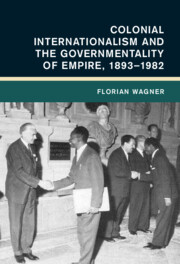Refine search
Actions for selected content:
3 results
1 - “More Beautiful than the Nationalist Thought”?
-
- Book:
- Colonial Internationalism and the Governmentality of Empire, 1893–1982
- Published online:
- 14 January 2022
- Print publication:
- 24 February 2022, pp 24-63
-
- Chapter
- Export citation
Introduction
-
- Book:
- Colonial Internationalism and the Governmentality of Empire, 1893–1982
- Published online:
- 14 January 2022
- Print publication:
- 24 February 2022, pp 1-23
-
- Chapter
- Export citation

Colonial Internationalism and the Governmentality of Empire, 1893–1982
-
- Published online:
- 14 January 2022
- Print publication:
- 24 February 2022
